This post is part of Mennonite Church USA’s #BeTransformed series. This post was originally published on A Light So Lovely. Reprinted with permission.
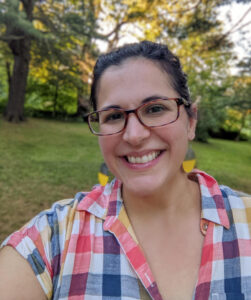 Melissa Marquez Weaver is a former English/ESL teacher who lives in the Shenandoah Valley of Virginia, where she cares for her husband and three young children, more pets than they planned on, unruly gardens, and her neighborhood. She serves as co-coordinator of Christian formation with Immanuel Mennonite Church, seeking to empower families and individuals to follow Christ by nurturing learning and practices of belonging, hospitality and hope. As part of her position, she writes a blog called A Light So Lovely. Her first chapbook “Welcome, Stranger: Poems of Making and Keeping Our Children,” was published by Finishing Line Press in 2021, and her poetry has appeared in Ekstasis Magazine, The Christian Century, Bravery Magazine, Mothers Always Write, Anabaptist Witness, The Anabaptist Journal of Australia and New Zealand and Transforming, a publication of Virginia Mennonite Missions.
Melissa Marquez Weaver is a former English/ESL teacher who lives in the Shenandoah Valley of Virginia, where she cares for her husband and three young children, more pets than they planned on, unruly gardens, and her neighborhood. She serves as co-coordinator of Christian formation with Immanuel Mennonite Church, seeking to empower families and individuals to follow Christ by nurturing learning and practices of belonging, hospitality and hope. As part of her position, she writes a blog called A Light So Lovely. Her first chapbook “Welcome, Stranger: Poems of Making and Keeping Our Children,” was published by Finishing Line Press in 2021, and her poetry has appeared in Ekstasis Magazine, The Christian Century, Bravery Magazine, Mothers Always Write, Anabaptist Witness, The Anabaptist Journal of Australia and New Zealand and Transforming, a publication of Virginia Mennonite Missions.
__________________________________________
Recently, I was influenced to dig through mud by a spiritual scholar.
I’d been reading “Grounded: Finding God in the World” by Diana Butler Bass, and her chapter on dirt stirred me. She traced our theological tension with soil: the fact that the washing away of sins and avoiding being soiled have inadvertently turned us against the earth, its care and its wisdom.
She urges caring for physical dirt and learning from Jesus, who used parables of good soil to indicate our receptiveness to God’s ways and the resulting fruitfulness.
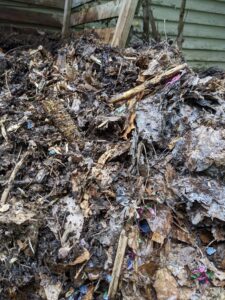 Bass says, “A friend of mine who is a pastor and a gardener insists, ‘God loves dirt more than plants, soil more than what it yields. God is a dirt farmer, not a vegetable gardener.”
Bass says, “A friend of mine who is a pastor and a gardener insists, ‘God loves dirt more than plants, soil more than what it yields. God is a dirt farmer, not a vegetable gardener.”
Enamored by her descriptions, I decided to spend an afternoon turning our neglected compost pile.
It was not as poetic as I had imagined.
Nor was there the amazingly rich ecosystem she had described — loamy, fluffy soil, as a result of our noble effort.
There were piles of dry leaves that had never decomposed, tangles of branches, several lost small toys, stinky peels, chicken poo and two rotting rats. Gag. Blech. Ugh.
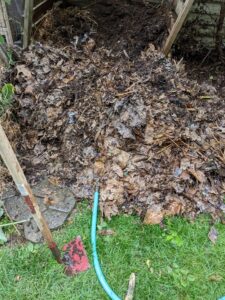 I was dismayed and sweaty and grossed out, confused why we didn’t have good dirt yet after several seasons.
I was dismayed and sweaty and grossed out, confused why we didn’t have good dirt yet after several seasons.
Apparently, we’d been cold composting instead of hot composting. Instead of having compost prepared in weeks to months, we had material that could take several years to be ready.
Both compost methods build dirt, both have their pros and cons, both are good for people at different seasons; but, basically, without us working our soil, we weren’t getting the transformation we had been pursuing.
This summer, I brought my kids along to volunteer at our school’s supplementary food program. Typically, packing happens on days my husband works remotely, so I can blissfully zone out and put together bags for area families who need weekend meals. When school is out, however, packing is less frequent and happens when I’m parenting solo.
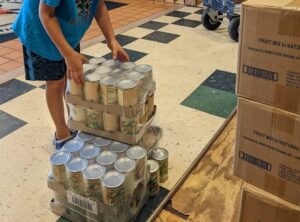
I imagined my kids — who’ve received tons of instruction about being helpers, the needs of our community and the importance of working hard — to be star packers and amaze the crew.
It was not as poetic as I had imagined.
Now, we’ve volunteered as a family before, and the kids have been a part of neighborhood friendships and service for years. However, that day, it felt chaotic, embarrassing, sweaty and frustrating. I wanted to disappear. I gave several angry hisses of, “Stop that right this instant; we’re supposed to be actually helping.” I felt the eyes of the other volunteers and cringed at my children’s moans that they were practically dying from the work and wanted to go home. Hadn’t I added enough over the years to the pile of instructions on loving your neighbor and being like Jesus and Mr. Rogers?
Somehow, I managed to pause and collect my heart. I remembered that service is a skill taught over time.
I reminded the kids that we were building our helping muscles, practicing giving to others, even if it’s uncomfortable. Mastering any exercise isn’t pretty or poetic. It takes time but also some messy, frustrating repetition.
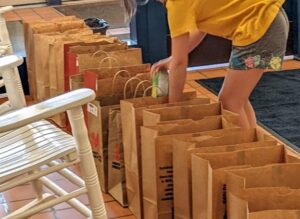 Building a sense of purpose and mission with our kids, a sense of belonging in the kingdom-coming of Jesus is a lot like my compost pile.
Building a sense of purpose and mission with our kids, a sense of belonging in the kingdom-coming of Jesus is a lot like my compost pile.
Yes, there are some seasons when all we need to do is add bits and pieces of wisdom — verses and songs and stories and living examples of faithful life.
God is gracious enough that this soil will eventually get richer, though it might take years.
What speeds formation up, deepens our families’ value of loving our neighbor as ourselves is messy movement.
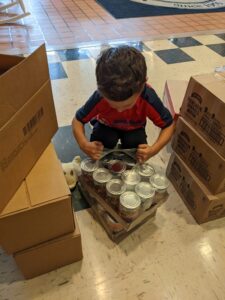
It’s packing canned goods, when together, the four of you somehow equal .75 of a volunteer. It’s dropping off dinner to a new mom down the street with ugly cookies made by your preschooler. It’s answering complex questions about homelessness and addiction, when you’d rather not, explaining history that’s pretty rotten, and getting sweaty and worn as you get knee-deep in the muck with your kids and loved ones. It’s light and oxygen and heat in a stinking pile of new and uncomfortable experiences that can help turn our kids’ — and our — hearts into receptive ground.
At the bottom of my muck pile was the brown gold I’d been searching for. Soft and rich and ready to help our plants and flowers thrive.
I believe we can be co-cultivators with God in the literal and metaphorical dirt in our lives. We can dig deep, get messy, make mistakes, push past the smells and whining and disappointing behaviors. We can eagerly expect the good soil to come if we’re faithful to till it and receive “the wind and the rain and God’s good will.”
***
We celebrated our morning of hard work with food truck lunch. Did my kids work hard enough to deserve it? Heavens, no. Do I want them to be spurred on toward love and good deeds by celebrating progress and purpose, absolutely yes.
Good soil is worth the work and wait.

